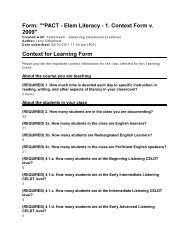The Tutoring Book - California State University, Sacramento
The Tutoring Book - California State University, Sacramento
The Tutoring Book - California State University, Sacramento
Create successful ePaper yourself
Turn your PDF publications into a flip-book with our unique Google optimized e-Paper software.
Are <strong>The</strong>re Proof-reading Traps Regarding ESL Students?<br />
85<br />
Keyko Torres<br />
Spring 2010<br />
As writing center tutors the discussion over Lower-Order Concerns (LOCs) vs. Higher-Order Concerns<br />
(HOCs) becomes a not very exciting one. Why? Because we are repeatedly told that though important,<br />
our priority should not be to edit papers and just proof-read for missing commas and other sentence-level<br />
problems. Instead we are supposed to look at the “big picture” and talk about ideas, analysis,<br />
brainstorming…etc. first and then proof-read.<br />
Ok I get it. Even the sign at the front desk tells students that we will not just “edit” a paper.<br />
But what happens when an English as Second Language (ESL) student walks in, and you realize he/she<br />
has the best ideas but cannot get them across because of sentence-level issues? What if they keep<br />
forgetting articles, or they have fragments galore, or they confuse words and make up their own? Do we<br />
ignore them because it is not “our job” and try to move on to “more pressing issues” that don’t exist?<br />
Of course not, and I’m not the only one that thinks so.<br />
Sharon Myers agrees with me in her article “Reassessing <strong>The</strong> ‘Proofreading Trap’: ESL <strong>Tutoring</strong> and<br />
Writing Instruction.” Myers also has issues with “writing center scholars and others who view sentencelevel<br />
revision for ESL students unethical” (219). I would find it even more unethical to expect ESL<br />
writers to learn in the same ways or at the same rates as native writers. Thinking back to Stephen North’s<br />
“Idea of the Writing Center,” he tells us that it our “job to produce better writer’s not better writing” (38).<br />
<strong>The</strong>refore we have to ask ourselves, what would make our tutee a better writer?<br />
Myers calls for tutors’ recognition “that so-called ‘sentence-level’ errors actually involve deeper levels of<br />
creating and processing meaning. By helping ESL students correct these errors, then, tutors can help<br />
students gain deeper insights into English syntax – an important step in becoming better readers and<br />
writers of the language” (219). This means that with our help in paying attention to the sentence level<br />
errors, we will help students become better acquainted with language and its lexical and syntactic<br />
conventions.<br />
<strong>The</strong> problem here lies when tutors and writing center scholars refuse to see the “the depth of the<br />
‘sentence-level’ problems involved in second-language processing” (Myers 221). It seems contradictory<br />
to say that “sentence-level problems” are deep, but when it comes to ESL students that can be the case<br />
because those problems may stem from their language barriers and cultural writing differences. For native<br />
speakers, grammar is second nature; we do not have to think about the differences between the past<br />
participle and the past imperfect, but they do. <strong>The</strong> hardest part is that sometimes they are aware of their<br />
mistakes and they do not know how to fix them. That’s where we come in. Native writers do not need the<br />
sentence-level editing to be a priority because if they read through their writing carefully, they will catch<br />
their mistakes and fix them. Unfortunately, non-native writers do not have these skills and sometimes<br />
think that they way they wrote something, although grammatically incorrect, is the correct way of doing<br />
it.<br />
Also, these small mistakes are a reflection of the problem they have communicating their ideas. <strong>The</strong>ir<br />
ideas might be there, but they do have the skills necessary to express them. So when to us it might seem<br />
like their word choice is just “awkward,” it could actually be a bigger problem than anticipated. It is<br />
important to keep this in mind and try to help them better express their ideas, because in this case their<br />
LOC’s are their only concerns and should be treated accordingly.

















